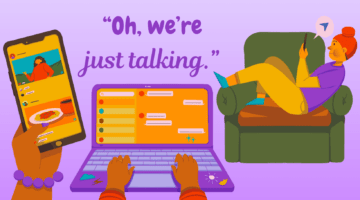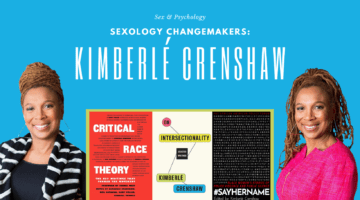Is There a Link Between Porn Use and Relationship Satisfaction? Actually, No
September 16, 2020 by Justin Lehmiller
Popular media reports frequently tout the damage that pornography use does to relationships. Some articles have made pretty bold claims, such as “porn-free relationships are stronger,” “watching porn can diminish relationship commitment,” and “the fantasy alternative” presented in porn “leads to real-world cheating.” In short, “porn kills love” has become a popular refrain.
These claims weren’t pulled out of thin air—many of them reference the results of past studies that have found links between porn use and relationship outcomes. However, there are some major problems with those studies that should lead to caution in drawing firm, cause-and-effect conclusions.
One issue is that pretty much all of these studies rely on reports from just one partner using a single-item assessment of recalled porn use (in which “porn” isn’t even defined!), often with a very long time-frame (e.g., How often have you used porn in the last year? How often have you used porn since you started your relationship?). Recall bias is a significant problem here because people are not very accurate when it comes to estimating their media usage in general.
However, an even bigger issue is that most of these studies are correlational, which means that you can’t make statements about causality. We therefore can’t say what is causing what, and we need to be mindful of the fact that past porn use is likely going to be confounded with other things—it’s not totally independent.
For example, past relationship problems (such as a sexual desire discrepancies) can potentially drive an increase in porn use. In fact, we know that people in sexless relationships often turn to solo sexual activities to fill the void, which means that porn use can sometimes be the consequence—not the cause—of a bigger issue. Without looking at the precursors of porn use, then, there’s not really much you can say definitively.
In order to get around these problems, a team of Canadian and US researchers recently conducted the first longitudinal, daily-diary study of porn use and relationships among couples. This allowed them to look at how changes in both porn use and relationship satisfaction unfold over time.
In total, 140 mixed-sex couples and 77 same-sex couples completed a brief survey every day for 35 days. Each partner in the relationship was asked to complete each survey, which included questions about porn use in the last 24 hours (defined broadly to include use of photos, videos, written, and audio materials depicting sexual activity), relationship satisfaction, sexual desire, and sexual behavior.
The nature of the data and analyses allowed researchers to look at whether porn use on one day predicted relationship satisfaction the following day, while controlling for relationship satisfaction the previous day. In other words, does porn predict daily changes in relationship satisfaction? They also tested for the inverse effect: does relationship satisfaction today predict changes in porn use tomorrow?
In most couples (81%), at least one partner used porn during the course of the study. On average, men reported using porn about 6 of the 35 days, whereas women used it about 2 days; however, there was significant variability between persons, with some not using it at all, and others using it nearly every day.
So was porn use linked to changes in how happy people were with their relationships? In the words of the study’s authors: “A participant’s previous day pornography use, as well as the partner’s previous day pornography use, were not significantly associated with today’s relationship satisfaction when controlling for their own previous day relationship satisfaction.”
Further: “A person’s previous day relationship satisfaction, as well as the partner’s previous day relationship satisfaction, were not significantly associated with today’s pornography use when controlling for their own previous day pornography use.”
Put simply, there was no effect either way.
Importantly, the link between porn use and relationship satisfaction did not depend upon whether the user was a man or a woman, or whether the relationship was same-sex or mixed-sex.
While no link emerged between porn use and relationship satisfaction, the researchers did document other associations. For example, on days women used porn (compared to days they didn’t), they were more likely to have partnered sex, regardless of whether they were in a same-sex or mixed-sex relationship. The same was true for men partnered with other men. However, for men partnered with women, they were actually less likely to have partnered sex on days they used porn.
Likewise, on days women used porn, both they and their partners reported greater desire for partnered sex. By contrast, on days men used porn, it was unrelated to their own desire for partnered sex, but it was related to their partner reporting lower desire.
However, these are all within-day associations, so it’s not entirely clear what they mean, which came first, or if the partners were even aware of each other’s porn use. Recall that on days men used porn, their partners reported lower desire for sex. This could be interpreted in various ways. For example, it might be that men are simply turning to porn as a substitute for sex on these days (i.e., low partner desire leads to porn use). Alternatively, it could be that the partner is feeling insecure or inadequate because they knew about the other’s porn use (i.e., porn use leads to low partner desire).
What these results tell us is that porn use is indeed linked to daily sexual dynamics within couple relationships, but in somewhat different ways for male and female porn users. There are still important questions about exactly what’s causing what, though.
However, on a daily, ongoing basis, porn use does not seem to be related to changes in relationship satisfaction, which challenges the popular view that porn is inherently detrimental to relationships.
The fact that no association emerged doesn’t necessarily mean that porn never affects relationship satisfaction, though. Porn might be positive for some, negative for others, and inconsequential for yet others; however, all of these effects might wash each other out if we’re only focused on the overall or average impact.
If we want to obtain a more nuanced understanding of how porn affects us, we can’t just look at porn use in a vacuum. How each of the partners feels about porn in general (acceptable vs. unacceptable, moral vs. immoral, secure vs. insecure), as well as the broader context in which it is used, are likely to play a crucial role in determining its effect on a given relationship.
Want to learn more about Sex and Psychology ? Click here for previous articles or follow the blog on Facebook (facebook.com/psychologyofsex), Twitter (@JustinLehmiller), or Reddit (reddit.com/r/psychologyofsex) to receive updates. You can also follow Dr. Lehmiller on YouTube and Instagram.
To learn more about this research, see: Vaillancourt-Morel, M. P., Rosen, N. O., Willoughby, B. J., Leonhardt, N. D., & Bergeron, S. (2020). Pornography use and romantic relationships: A dyadic daily diary study. Journal of Social and Personal Relationships, 37(10-11), 2802-2821.
Image Source: 123RF
You Might Also Like:

Dr. Justin Lehmiller
Founder & Owner of Sex and PsychologyDr. Justin Lehmiller is a social psychologist and Research Fellow at The Kinsey Institute. He runs the Sex and Psychology blog and podcast and is author of the popular book Tell Me What You Want. Dr. Lehmiller is an award-winning educator, and a prolific researcher who has published more than 50 academic works.
Read full bio >


